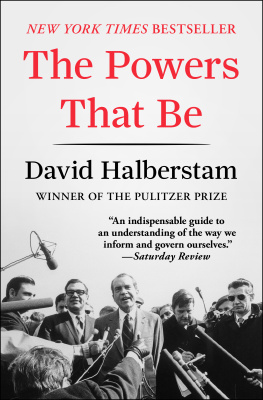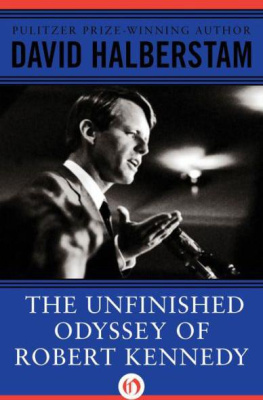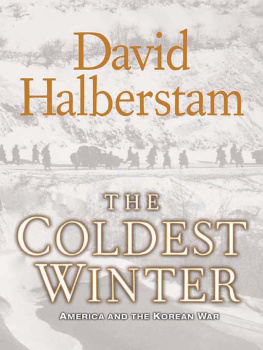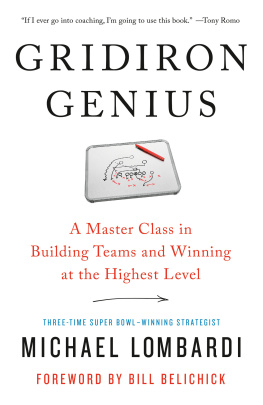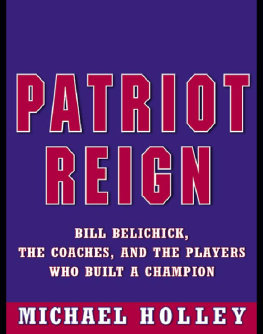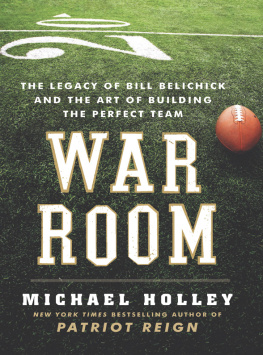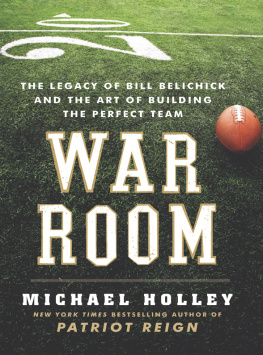
For Gay and Nan Talese
That year, in the fall of 1957, when the boy was only five years old, the father had scouted Army at least four times. The father was considered by many colleagues to be the preeminent football scout in the country, and he was gone almost every fall weekend, analyzing Navys upcoming opponent; he liked to joke after he retired that the only game he had ever watched Navy play in all his years at the Academy was the one with Army, because it was the last game of the year, and there was no other team to scout that week. This was Steve Belichicks second year as an assistant coach at the Naval Academy. In those days, when professional football had not yet become the dominant part of the football universe, the Army-Navy game was still a considerable sporting event, and that year both Army and Navy had formidable teams. Each had lost only one game, Army to Notre Dame by two points, Navy to North Carolina by a touchdown (it had also tied Duke). That was a magnificent Army team, physical if not versatile, and it featured two formidable running backs: Pete Dawkins, a scholar-athlete and already something of a national hero, and Bob Anderson, who was, if anything, a heavier, more punishing runner. Both were All-Americans. Army was leading the nation at the time in rushing and was ranked second in total offense and scoring. But Steve Belichick did not think it took the most brilliant of scouts to figure out the Army game plan, and he was not particularly impressed with his own pregame analysis and predictions, though they later seemed quite accurate. He thought he had done a good job of detailing the obvious, but there were many other games when his role as a scout had been more important.
For if Army had great strength in its running game, it was not matched by a comparable passing game. The Cadets averaged 323 yards on the ground and only 81 passing. It was therefore an imbalanced offense, one, Belichick suspected, that would be comparatively easy to defend against. The Army coach, Red Blaik, was conservative. He did not like to throw the ball, and in particular he did not like to throw when he got near the goal line. The Cadets preferred a power game to a speed game, off-tackle runs rather than sweeps, and they had been rewarded all season long for the strategy. All you had to do at critical moments, Belichick thought, was pack the defenders in tight and keep the Army runners from getting outside. If you deployed your defenders in the right way, and cut off certain angles and slants, the Army runners could not cut back. An Army quarterback who could throw even a simple pass down on the goal line might exploit so imbalanced a defense, Belichick knew, but he did not think Army had either that passer or the inclination to throw the ball. Belichicks general defensive philosophy was simple: Find out what the other guys do bestwhich is what they always want to do, especially under pressure in a big gametake it away from them, and make them do things that they are uncomfortable with.
Belichick was watching from the press box that day. Eddie Erdelatz, the Navy head coach, liked to call him my upstairs coach, because Belichick preferred watching the game from up there, in no small part because he got nervous when he worked the sidelines. Bill, his son, was at home. He was judged to be too young to go to Philadelphia for the game, and so one of his uncles had come down from Ohio to babysit, with the game on the television set, of course. (Bill would see his first Army-Navy game live two years later when Joe Bellino, his first football hero, scored three touchdowns in the first game Bill ever remembered seeing, a 4312 Navy victory.) Aged five, Bill was still a few years away from helping his father go over film, and still so new to the game that when he was told he was being taken to see William and Mary play, he wondered if William would beat Mary.
On that day in December 1957, Navy stopped a great Army team cold, shutting it out, 140. True, it was a muddy field, but that did not seem to matter very much and perhaps should have helped Army. The Cadets gained a total of only eighty-eight yards on the ground, and forty-eight yards in the air. They threw fourteen passes and completed six. The next year, in order to keep the Navy defense from packing in against the run, Blaik came up with his idea of the lonely enda receiver stationed some twenty yards from everyone else, receiving the signals from the quarterback by, it seemed to opposing teams, mental telepathy. That formation put a great deal more pressure on the defenses, loosened them up significantly, and brought Army a greater measure of success and Dawkins the Heisman Trophy. But the 1957 game was a stunning victory for Navy, and after the game Shirley Povich, the famed Washington Post columnist, sought out Erdelatz to congratulate him on a superlative victory. Erdelatz pointed to Steve Belichick and said, He won the game for us two weeks ago. Belichick did not think he had done anything exceptional, just done his job, and what he had seen was what any good football man would have seen.
CONTENTS
When the clock was finally winding down, the seconds ticking off, with the Philadelphia team unconscionably slow in getting its plays off, Steve Belichick, always in the background whenever there were television cameras around, left his place behind some of the New England players, back around the 50-yard line. Moving quickly, he headed toward the 35, wanting to share this final glorious moment with his son, Bill, the coach of New England, about to win his third Super Bowl victory in four years. Bill Belichick himself was puzzled at that moment by the slow, almost languid way the Eagles were running their plays, as if they were the ones with the lead, not the Patriots, and they wanted to burn the clock. He kept checking the scoreboard, which said 2414, as if perhaps he was the one who had the score wrong. He called his assistants, Romeo Crennel and Eric Mangini, on the headphones to make sure the Patriots did indeed enjoy a ten-point lead. Have I got the score right? he asked, and they assured him he did. Then what the hell are they trying to do? he asked. His assistants did not know, either. The long, slow drive had finally culminated in a Philadelphia score, because of a blown defensive coverage on the part of the Patriots; the correct defense, designed to give up a limited number of yards in exchange for more time off the clock, had not been sent in or used, and Philadelphia scored on a 30-yard pass play. Seeing that his players were in the wrong coverage, Belichick had tried desperately to call time-out, but he had been too late, and the Eagles had scored. Belichick had been momentarily furious, mostly at himself, because he demanded perfection first and foremost of himself. But the score had served only to make the game closer; it had not affected the final outcome.
Steve Belichick got to his sons side just in time to be soaked by Gatorade in the ritual shower of the victorious. That gave him his first great moment of celebrity, coming at the end of a six-decade career of playing and coaching football, and that moment was witnessed by much of the entire nation, live and in color, on national television. One could imagine one of those Disneyland commercials, generally accorded the young and instantly famous at moments like these, when a voice would ask, Steve Belichick, youve been coaching and playing for sixty years, where are you going now that your son has won his third Super Bowl in four years?
It was one of the best moments of the entire Super Bowl extravaganza, filled as it is so often with moments of artificial emotion, because this moment was absolutely genuine, father and son drenched together, emotion finally showing on the face of the son, usually so reticent about showing emotion, as if to do so was to give away some precious bit of control, to fall victim at least momentarily to the whims of the modern media trap. Father and son were bonded in this instant by the joy of victory and by the shared experience of a lifetime of coaching, with all its bitter as well as celebratory moments.
Next page

